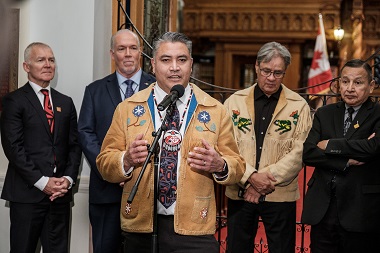
Last fall, BC was the first province to adopt the UN Declaration on the Rights of Indigenous Peoples into law. Photo from BC Government.
The Commission on Justice and Peace of the Canadian Council of Churches sent a letter to the Minister of Justice and Attorney General of Canada in support of the Government of Canada’s commitment to pass legislation to create a framework to implement the United Nations Declaration on the Rights of Indigenous Peoples [UNDRIP]. . . .
In the recent throne speech, the Government of Canada promised to introduce the legislation before the end of 2020.
The Honourable David Lametti
Minister of Justice and Attorney General of Canada
[email protected]
October 7, 2020
Dear Minister Lametti,
We write to express our support for the Government of Canada’s commitment to pass legislation that creates a framework to implement the United Nations Declaration on the Rights of Indigenous Peoples.
The Commission on Justice and Peace of the Canadian Council of Churches, along with many other faith communities, has affirmed the Declaration as a framework for reconciliation in response to the Truth and Reconciliation Commission’s Call to Action #48. Further parliamentary action on the Declaration is a critical element of our collective responsibility for reconciliation.
Our support for such legislation is framed and shaped by the following considerations:
- Bill C-262 was passed by the House of Commons in the last Parliament. That bill had the wide support of Indigenous communities, was the subject of helpful debate in a Parliamentary committee (including testimony from 71 witnesses) and had the active support of many faith and civil society groups. We are pleased to hear that the Government of Canada considers Bill C-262 to be the floor for implementation legislation in this Parliament and will support that principle.
- Public spotlights on systemic racism further underline the urgency of measures to protect Indigenous rights in law. Therefore, we urge you to honour the Government of Canada’s commitment to the legislation as a high priority.
- Adequate and clear commitments to community-based consultation and implementation, both during the legislation creation process and once legislation is in place, are essential to any co-development efforts focused on Indigenous support for the legislation.
- The Truth and Reconciliation Commission refers to the Declaration as a framework for reconciliation in both Call to Action 43 and 48. We trust that legislative implementation of the Declaration would move Canada from noble words of apology and aspiration to active and justiciable Indigenous rights. This is critical for the integrity of reconciliation in this place today called Canada.
We believe that building a new relationship with Indigenous Peoples by passing legislation to provide a framework for implementing the Declaration should be a non-partisan issue that warrants the support of all Parliamentarians. We urge the government to do all that is possible to promote constructive dialogue on this issue of such importance for our country and to ensure the development and passage of the legislation that is indeed built on the floor established by Bill C -262.
Sincerely,
Sister Donna Geernaert, SC
Chair, Commission on Justice and Peace, Canadian Council of Churches
Cc.
The Right Honourable Justin Trudeau, Prime Minister of Canada
The Honourable Carolyn Bennett, Minister of Crown Indigenous Relations
The Honourable Marc Miller, Minister of Indigenous Services
The Honourable Rob Moore, Shadow Minister for Justice and the Attorney General of Canada, Conservative Party of Canada
Cathy McLeod, Shadow Minister for Crown-Indigenous Relations
Gary Vidal, Shadow Minister for Indigenous Services, Conservative Party of Canada
Jagmeet Singh, Critic for Crown-Indigenous Relations and Indigenous Services, New Democratic Party of Canada
Alistair MacGregor, Critic for Justice, New Democratic Party
Rhéal Fortin, le porte-parole du Bloc Québécois en matière de justice
Sylvie Berube, Critic for Crown-Indigenous Relations, Bloc Quebecois
Annamie Paul, Leader Green Party of Canada
Rev. Stephen Kendall, President, The Canadian Council of Churches
Pastor Peter Noteboom, General Secretary, the Canadian Council of Churches
The Canadian Council of Churches is a broad and inclusive ecumenical body, now representing 26 member churches including Anglican; Eastern and Roman Catholic; Evangelical; Free Church; Eastern and Oriental Orthodox; and Historic Protestant traditions.
